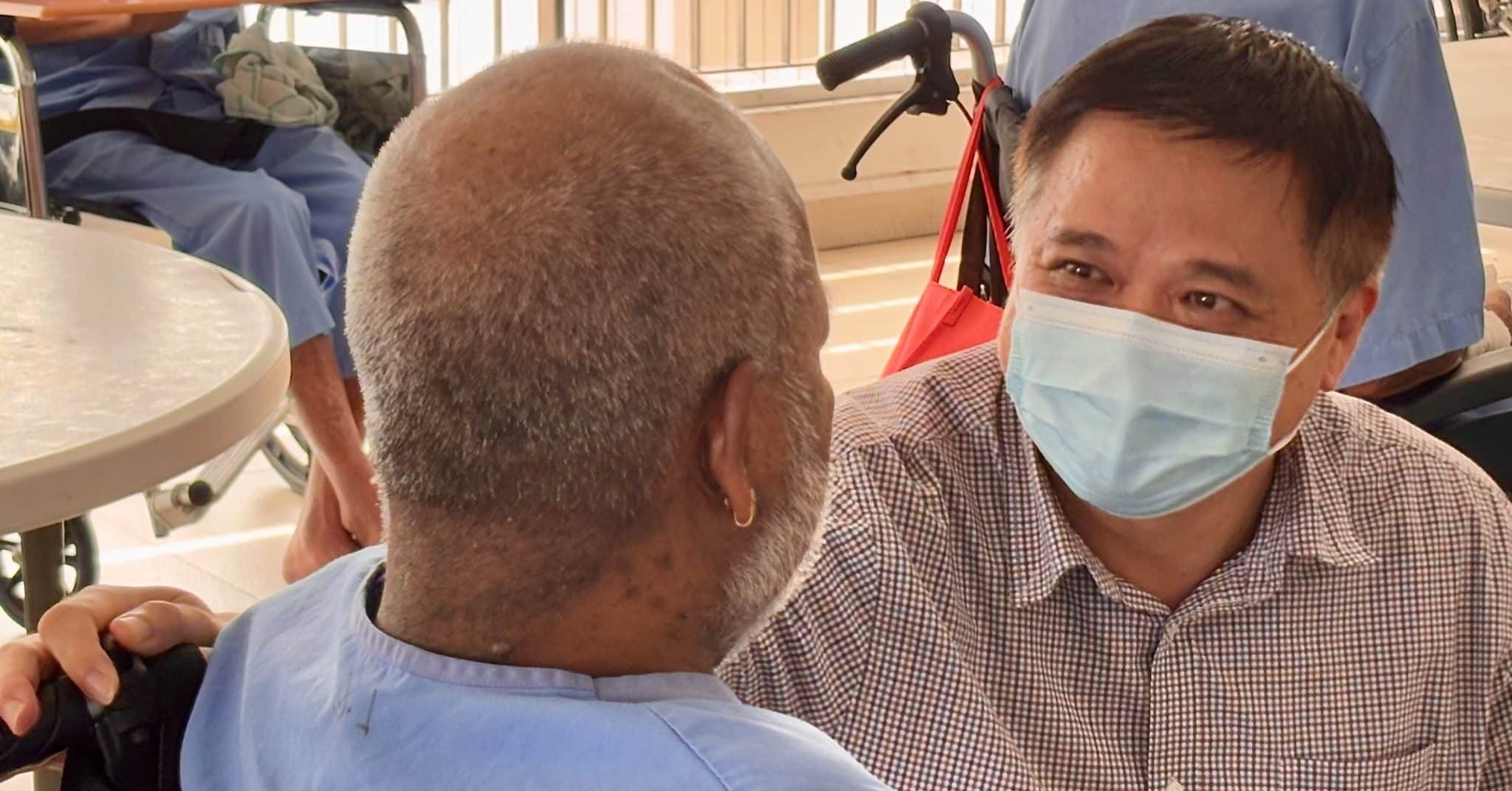God is at work, and “depression will not be the end of the story,” says author Diane Gruver
Diana Gruver // December 21, 2021, 12:15 pm

Stories of the "not-yet" are ones that shape us to look for God not only in victory but also in seeming defeat, when we are left without answers to our pain, writes Diana Gruver, author of Companions in the Darkness: Seven Saints Who Struggled with Depression and Doubt. Photo by Marcos Paulo Prado on Unsplash.
Testimonies have been a staple of church life for as long as I can remember. They are for the body of Christ to share how God is at work. As they have since the days of the very first disciples, they remind us how God entered our story and of the ways His grace transformed us.
And as we rehearse them back to each other, these stories form us.
They remind us of the nature of the Kingdom and shape our vision of it. They teach us what to value – what is worthy of celebration and what God cares about.
They spark our imagination of how our lives fit into God’s grand story of redemption.
The role of testimonies
Through the testimonies I’ve heard over the years, I’ve been shaped to believe in a God who brings healing from illness, who comforts in grief, who provides for our needs. They’ve shown me how He can break into doubt, rebellion, or apathy and kindle a heart that loves Him.
All of these things are true and beautiful.
These stories shaped me to expect God to work, to hold space for the miraculous.
But there were few of the everyday grace of God that could sustain in the midst of suffering, when the healing didn’t come. There were few stories of the “not-yet”.
We are formed not only by what we hear, but by what we don’t hear.
Over the years, I’ve come to see that the types of stories we choose to tell communicate something. We are formed not only by what we hear, but by what we don’t hear.
If I only hear stories of the miraculous in the context of healing, I can easily lose sight of or discount the miraculous in the form of day-to-day sustaining strength. If I only hear of God’s work in victorious, “happy endings” I more easily wonder where He is (or what I’m doing wrong) when suffering endures.
These are not principles explicitly taught, because they don’t need to be. The stories themselves do the teaching.
The absent stories
It was seasons of suffering that showed me this reality, when the last thing I needed was another story of how things “worked out in the end”.
I needed stories that could shape my heart to see God’s goodness when my prayers hadn’t been answered in the ways I’d hoped, when my heart was cracked open by pain, when my faith felt thin.
I needed stories that could shape my heart to see God’s goodness when my prayers hadn’t been answered in the ways I’d hoped.
In my own story, I’ve specifically come to realise how this applies to how we talk about depression.
As I think back on the many testimonies I’ve heard during a church service, I can’t think of a single one that was about living with a mental health challenge.
I’ve heard stories of sickness, grief, job loss, and doubt – but none about depression or another mental illness.
Yet, one in five US adults experiences mental illness each year, and about 7 per cent of US adults suffer from depression each year. If you do the math for your own church, how many people does this represent in the pews?
The absence of these stories formed me – to wonder painfully what I had done wrong to be lost in darkness, to wonder why, in the midst of depression, I couldn’t hear God’s voice.
So I was surprised when I started to hear stories about depression in church history. As I write about in Companions in the Darkness, I didn’t expect some of my heroes to have suffered as I had, and as I journeyed with them, I couldn’t help but ask why I had never heard their stories.
How differently I would have been formed if I’d been able to hear their testimonies – or those of saints alive today – before I’d walked through depression myself.
Truths about depression
Now I can see the unique gift these stories offer the church in preparing and equipping God’s people in the face of depression and doubt. They teach some important truths.
Depression is not a sign of personal failure. Time and time again we see that sometimes the saints are cast into darkness.
Sometimes our brains become sick, just as other parts of our bodies do. This is not because our faith is weak, our lives undisciplined, our spirits wayward. (Can you imagine suggesting these things of giants like Charles Spurgeon, Martin Luther, or Mother Teresa?)
God is faithful to sustain us and keep company with us in the midst of suffering, even if we can’t “feel” it.
Hearing stories of depression forms us to know that this is a trial some of us must walk, so we are not dismayed if it comes.
God is faithful to sustain us and keep company with us in the midst of suffering, and this is true even if we can’t “feel” it.
In the midst of depression, it became easy to feel as though God had left me in the dark. My emotions and thoughts were clouded, and much like I felt distant from others who loved me, I couldn’t sense His presence.
Hearing the stories of others who had walked this road before me would have prepared me for this. They tell us that regardless of what our emotions or depressed thought patterns might suggest, God has not abandoned us.
They shape us to see His miraculous work not only in instantaneous healing, but also in the steady presence of friends and loved ones who care for us and in the threads of hope that give us courage to keep breathing each day.
God can still use us in spite of depression. Depression will not be the end of the story.
God can still use us in spite of depression. Depression will not be the end of the story.
When depression tempts us to question our purpose and wonder what we have left to offer, we can turn to stories of how God used others who suffered as we do. Their legacies offer hope that maybe, like them, He can work through us in spite of depression, and maybe, astonishingly, in the midst of it.
Their stories remind us that God faithfully works in the midst of weakness, that His strength is always perfect – and that we might not feel those realities emotively in real-time.
They remind us of the resurrecting God, who relentlessly brings life from dead things.
God is in the “not yet”
So many of us will not get to experience full healing from depression or clear redemption of our suffering in this lifetime. We will never be able to tell a resolved, clear-cut tale during church testimony time.
But we have a story to tell.
We can tell of how deep He is willing to descend into the darkness with us and of His mercy to keep company with us there.
We have testimonies to God’s sustaining power, of His strength in weakness, of the inexplicable sufficiency of His grace.
We can tell of how deep He is willing to descend into the darkness with us and of His mercy to keep company with us there.
We can speak of His faithfulness, even when we felt we had no faith left.
These are stories that form us in the “not-yet”. They are ones that shape us to look for God not only in victory but also in seeming defeat, to seek out what is sure when we are left without answers to our pain.
These are stories the body of Christ needs – and we have only to ask the saints in our midst to tell them.
This article was written for Missio Alliance and is republished with permission.
SAINTS WHO ARE WALKING THROUGH DEPRESSION:
He tried to run away, but God taught this ultra-marathoner to run from depression instead
“To live is Christ, to die is gain”: A full-time church worker’s struggle with suicide
We are an independent, non-profit organisation that relies on the generosity of our readers, such as yourself, to continue serving the kingdom. Every dollar donated goes directly back into our editorial coverage.
Would you consider partnering with us in our kingdom work by supporting us financially, either as a one-off donation, or a recurring pledge?
Support Salt&Light



